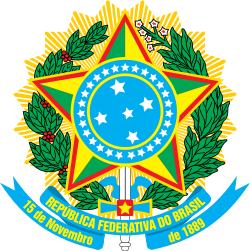Superior Electoral Court
The Superior Electoral Court (Portuguese: Tribunal Superior Eleitoral, TSE) is the highest body of the Brazilian Electoral Justice, which also comprises one Regional Electoral Court (Portuguese: Tribunal Regional Eleitoral, TRE) in each of the 26 states and the Federal District of the country, as determined by Article 118 of the Constitution of Brazil.

 |
|---|
| This article is part of a series on the politics and government of Brazil |
|
|
|
Administrative divisions
|
|
|
Background and legal provisions
The Brazilian Electoral Code of 1932 established the Electoral Justice in Brazil, replacing the political system conducted by the Legislative branch over the electoral proceedings.[1] The new judicial system transferred control over such proceedings to the Judiciary. In the present, duties of the Electoral Justice are regulated by a posterior Electoral Code, approved in 1965 (Law No. 4.737/65),[2] which revoked the 1932 code, but kept the judicial control over the electoral proceedings.
The Superior Electoral Court is the highest judicial body of the Brazilian Electoral Justice as per Article 121, §3 of the Brazilian Constitution of 1988, which sets that the decisions of the Superior Electoral Court are unappealable, except those contrary to the Constitution, or that deny habeas corpus or writs of mandamus. Therefore, in such exceptions, the Supreme Federal Court judges appeals filed against the Superior Electoral Court's rulings.
The composition of the court is ruled by Article 119 of the Constitution of Brazil, which sets that the court shall be composed by seven members. Three of them shall be elected by secret vote from among the Justices of the Supreme Federal Court and two other judges shall be elected by secret vote from among the Justices of the Superior Court of Justice. The remaining two shall be appointed by the President of Brazil from among six lawyers of notable juridical knowledge and good moral reputation nominated by the Supreme Federal Court.
References
- SILVA, José Afonso da. Curso de Direito Constitucional Positivo. 33ª Ed. São Paulo: Malheiros, 2009.
- MARTINS, Flavia Bahia. Direito constitucional. 2ª Ed. Niterói: Impetus, 2011.